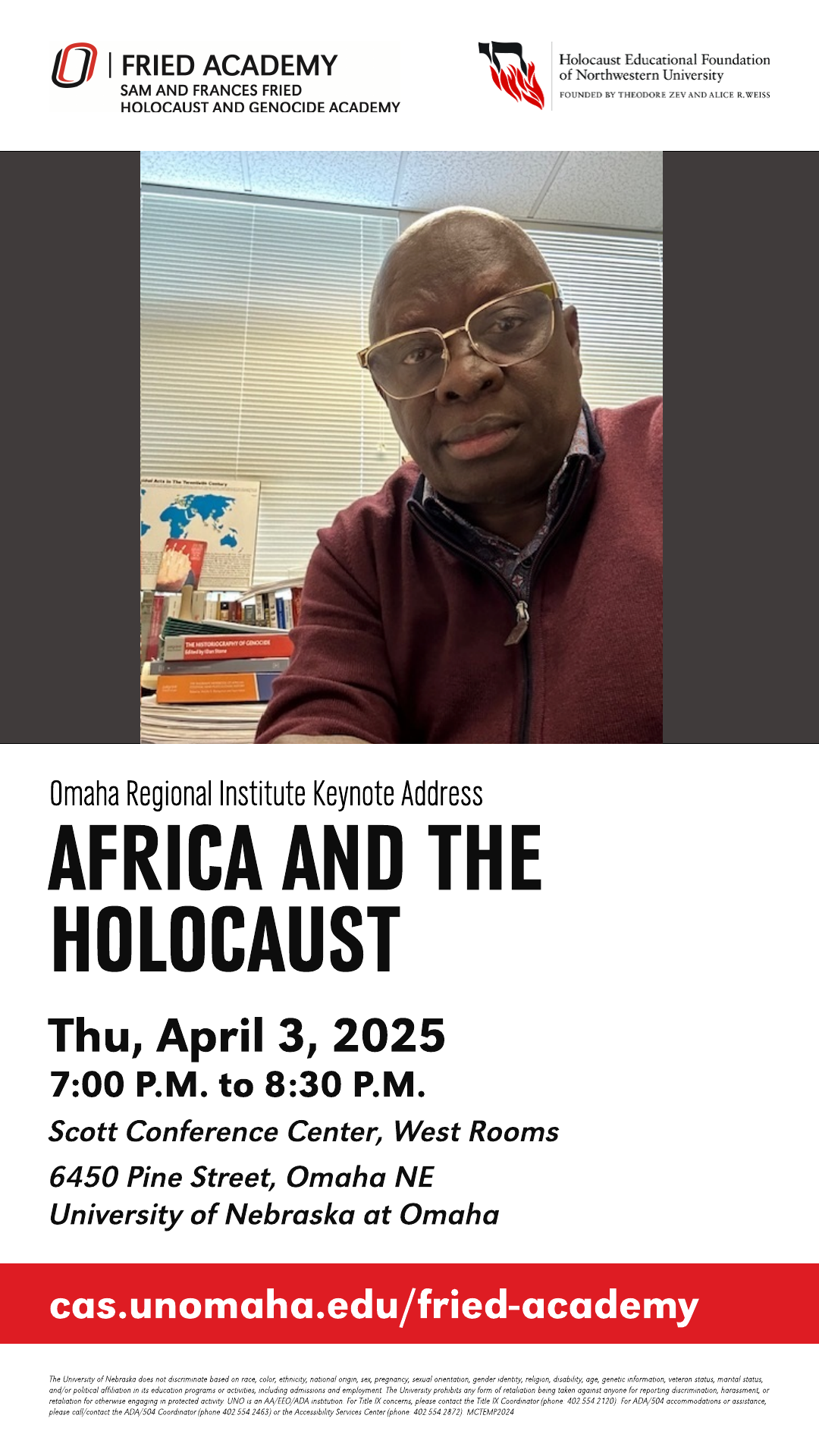GLOBAL APPROACHES TO THE HOLOCAUST
HEFNU Regional Institute on the Holocaust and Jewish Civilization
April 3-5, 2025 | Omaha Nebraska
ABOUT THE OMAHA REGIONAL INSTITUTE | "AFRICA AND THE HOLOCAUST" (KEYNOTE ADDRESS)
|
|
The Holocaust happened in Europe and was a catastrophe for its direct Jewish and non-Jewish victims. But it had reverberations in Africa. For the non-Jewish and non-European "distant observers" of the Holocaust in West and East Africa, the Nazi anti-Jewish campaign in Europe had a particular significance. The Holocaust reminded many groups in sub Saharan Africa, even the Western-educated who had accommodated some of the conventional justifications of "colonialism" and "European superiority," that their cherished indigenous cultures could potentially be threatened by the Nazi regime that had little regard for the institution of family. From the recorded sentiments of sub-Saharan Africans who paid attention to contemporaneous Holocaust-related reports, the anti-Jewish violence inflicted by Nazi Germany and its allies struck a historical, cultural, and moral nerve. In West and East Africa, the Holocaust provoked an instant reassessment of "Europe" as the "center of the universe" in the colonial narrative, "Empire and Christianity" as the conduits of civilization, and "Europeans" as the embodimentsof progress.
Dr. Edward Kissi
Edward Kissi is a Professor at the School of Interdisciplinary Global Studies at the University of South Florida. His research focuses on the post-20th century history of West and East Africa, the comparative history of genocide and human rights, and sub-Saharan African perspectives on the Holocaust. In 2009, Kissi was invited by the United Nations to write "The Holocaust as a Guidepost for Genocide Detection and Prevention in Africa" for the landmark United Nations' Discussion Papers Journal. He has since been involved in major national and international activities on Holocaust and Genocide Education, including UNESCO's on-going initiatives on Holocaust and Genocide Education in Africa. Kissi has also been featured in the new National Geographic documentary Nazis at Nuremberg: The Lost Testimony, which made its U.S. debut in January 2023.
His latest book Africans and the Holocaust (2019/2020) is a pioneering effort to integrate sub-Saharan African perspectives on the Holocaust into Holocaust Studies and incorporate Holocaust content into African history and Africana Studies.
ABOUT THE OMAHA REGIONAL INSTITUTE
Scholars continue to challenge the idea that the Holocaust was an exclusively European project. Recent research exploring the history, memory and representation of the Holocaust has focused on countries in Asia, Africa, North and South America, the Middle East and Australia. The Omaha Regional Institute asks how does our understanding of the Holocaust change when we shift focus from a primarily European perspective and adopt a more global approach? What new insights are gained from exploring the impact of the Holocaust from outside Europe? How do countries that were not directly impacted by Nazi policies of occupation and extermination remember the Holocaust? What consequences does a global approach to the Holocaust entail?
The Omaha Regional Institute offers an opportunity for university-level instructors and museum professionals to expand their knowledge about the global dimensions of the Holocaust. The Regional Institute will focus especially on how the Holocaust has been approached in Africa, Asia, North and South America, and the Middle East. The institute’s teaching faculty include Mehnaz Afridi (Manhattan University), Rebecca Erbelding (Holocaust historian and author), Yael Siman (Iberoamericana University) and Ran Zwigenberg (Penn State). Edward Kissi (University of South Florida) will deliver the keynote lecture.
